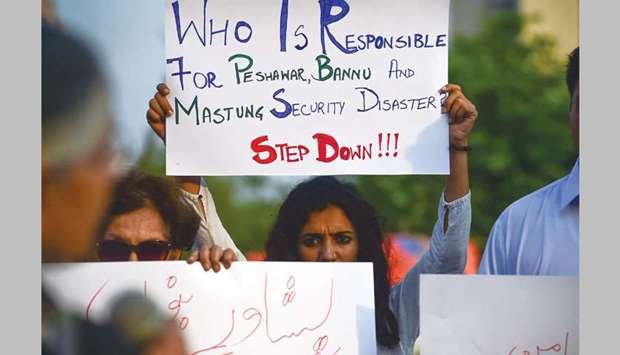Around 200 people were also wounded in the attack, which occurred in Mastung district, spokesman Shakeel Ahmad told DPA yesterday.
“The number of dead is feared to increase,” said Kamran Kassi, medical superintendent at Quetta’s civil hospital.
He told DPA that a number of injured were in critical condition.
Meanwhile, the federal government of Pakistan has declared Sunday, today, as a day of national mourning over recent terrorist attacks in Baluchistan and Khyber Pakhtunkhwa.
“In view of tragic incidents of terrorist attacks at Peshawar on July 10 and in Mastung and Bannu on July 13, the federal government has announced to observe one day official mourning throughout the country” on Sunday, said an official announcement from the Prime Minister’s Office yesterday.
It said that the national flag will fly at half-mast today to mourn the deaths of nearly 150 people in the recent terrorist attacks ahead of the general elections.
The PM’s Office also directed the ministry of interior to formally issue a notification for declaration of Sunday as the day of mourning.
The National Counter Terrorism Authority (NACTA) had on July 9 named six politicians – including Pakistan Tehreek-e-Insaf (PTI), Awami National Party (ANP), and Qaumi Watan Party (QWP) chiefs – who are under threat of terrorist attacks.
On July 10, the ANP candidate from PK-78 Peshawar, Haroon Bilour, and 19 others were killed in an attack targeting the party’s election meeting.
Tehreek-e-Taliban Pakistan (TTP), which had also claimed responsibility of the killing of his father Bashir Bilour in 2012, claimed responsibility of the attack.
On July 13, the convoy of Muttahida Majlis-e-Amal (MMA) candidate from NA-35 Bannu came under attack.
While former chief minister Akram Khan Durrani, who had also been named in NACTA list, survived the attack, four of his supporters did not.
Later in the afternoon, a powerful bomb blast targeted a meeting of Baluchistan Awami Party (BAP) candidate from PB-35 Mastung, Nawabzada Siraj Raisani.
Raisani, and at least 127 others, were killed in the attack, while more than 200 were injured.
A video clip showed Raisani speaking just before the attack, greeting crowds seated on the ground under a large tent before the blast hit and the image cut off.
A party official said the attack would not dent its hopes.
“It’s a big loss as far as Mr Raisani is concerned for us ... but will it reverse the course of the political party? No,” said Anwar ul Haq Kakar, a BAP member of Pakistan’s Senate.
The Mastung attack was the deadliest terror attack in the country since the attack on Army Public School Peshawar in 2014 that stunned the nation.
Newspapers branded the blast – one of the deadliest in Pakistan’s history – a “massacre”, as analysts and media called on the military to, in the words of the daily Dawn, “do the job they are meant to do – i.e. preventing attacks”.
Security analyst Rahimullah Yusufzai termed the blasts a “wave of terror” that indicated co-ordination between militant groups, and noted that security forces could not protect every single campaign event.
He predicted the bloodshed would continue “until the election and even after”.
Other attacks on Jamiat Ulema-e-Islam – Fazlur (JUI-F) and PTI election campaigns in different parts of Khyber Pakhtunkhwa have injured several others since the beginning of this month.
The Election Commission of Pakistan (ECP) has called for a briefing from NACTA over the worsening security situation.
Meanwhile, political parties have demanded better security arrangements to ensure that they can freely conduct their election campaigns.
Apprised of the threat to his own campaign, the Pakistan Peoples Party (PPP) chairperson Bilawal Bhutto Zardari has announced suspending political activities across the country in solidarity with the victims of recent terror attacks.
He said at a news conference in Peshawar: “120 people are dead in Baluchistan; each one of them have families. What would they think when they see me chanting slogans in rallies. I could never do that.”
Pakistan’s campaign until this week had been relatively peaceful, compared with frequent attacks by the Pakistani Taliban during the 2013 election, which saw 170 people killed, according to statistics from the Pakistan Institute for Peace Studies.
Then, three attacks over four days killed at least 152 people.
Although overall violence has ebbed in Pakistan in recent years following an army offensive on militant strongholds in the northwest, both the Pakistani Taliban and Islamic State still launch attacks from across the border in Afghanistan.
Pakistan’s army will deploy about 371,000 troops on election day, almost three times the number in 2013, to protect the polling places.
There are widespread allegations from the media, politicians and analysts that the powerful security establishment is meddling in the polls.
“It has never been more true that Pakistan’s security establishment needs to focus on security, not politics,” tweeted analyst Mosharraf Zaidi as mourners gathered to bury their dead in Mastung yesterday.
More funerals were planned for the afternoon.
Hospitals in the area have been placed under “emergency” management after being overwhelmed in the hours after the attack, with around 150 also wounded in the blast – many still in critical condition.
“I could hear voices screaming. I tried to get up and I saw people trying to run towards the gate. They were trampling over dead bodies,” survivor Rustam Raisani told AFP from his hospital bed.
“We have imposed emergency (management) in the hospitals and cancelled the vacations of the doctors and paramedics,” Baluchistan Home Minister Agha Umar Bungalzai told AFP.
The provincial home secretary Haider Shako added that extra security forces had been deployed in “sensitive areas” and warned politicians to remain “vigilant”.

